
The Journey Of A Boskalis Dredge by Visuals Studio Brazil

RIO DE JANEIRO – Like in any career a workday of a journalist-director has its ‘everyday’ projects. But with some projects you only realize afterwards how special they really were. This reflection also occurs at this time of writing, when Broadcast Brazil asked me to put something down on paper about this recent documentary-project.
Often you only receive a few words; "... special transport ... a dredger through the jungle of Suriname on ... 350 tires ... say a sharp
challenge for both man and machine ... ". But as a director you instantly feel that with this meagre list of ingredients you have something special in the hands.
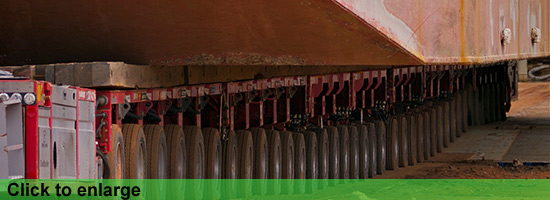
After the first contact with the Communication Department from the headquarters of Royal Boskalis Westminster, I was redirected to the regional manager in Paramaribo for further planning and details. He told me because of persistent and heavy rainfall in the last weeks, the transport has been postponed several times. Suriname deals with an unusual lot of water, where in a few weeks time more inches dropped then usually throughout the entire rain season.
But as experience shows ... delay is inherent in the maritime industry. Despite tight time schedules and a detailed scenario, the factor "weather" always comes unpredictable. And so the initial date for the transportation was shifted to three weeks later, hoping for some drier days. All in standby mode, meaning the calendar blocked, including my Belgian assisting cameraman who will fly straight too Paramaribo.
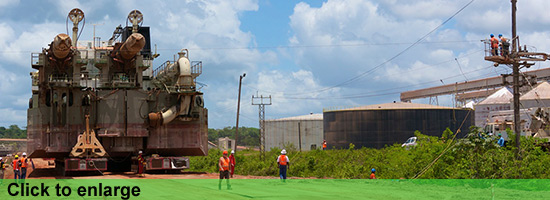
But unexpectedly the standby was two days shortened by an email with green light. The last two dry days indicates the start of an unique mobilization plan for the transport of one of the largest dredgers from the Boskalis fleet, the Orion. A huge cutter dredger of 1813 ton, 74 meters long and 15 meters wide, with its destination a bauxite mine south of Paramaribo. Here the Orion will excavate the valuable raw material for aluminium, for the next two years.
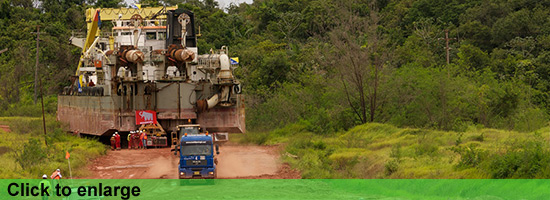
A month earlier, the Orion was put on a special transport ship, the Roll Dock Sea, in Abu Dhabi. Once arrived the cutter ship is put ashore at Paramaribo by means of a special constructed jetty to be able to put the ship on a 'train' of trailers, consisting of 305 air tires from the Dutch transport and heavy lifting company Mammoet.
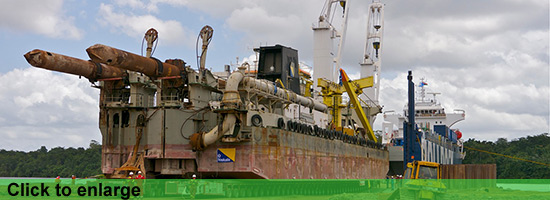
A carefully elaborated mobilization scenario shows the various 'obstacles' on the route during 14 kilometers during 13 days, from jetty to the final destination, a dry mine pit in a jungle lake.
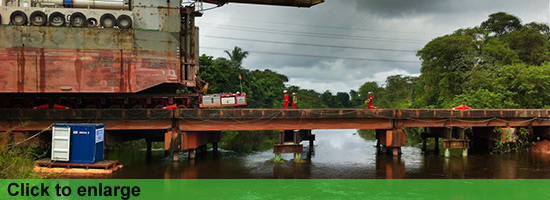
The Orion faces numerous challenges such as (too) low hanging power lines for its 15 meter height. Three sets of power masts had to be lifted, causing a temporarily electricity cut in the biggest part of Paramaribo city for a few hours.
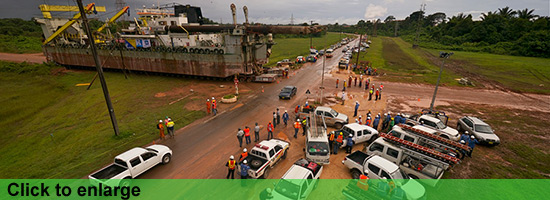
Another challenge is a narrow bridge that needs to be crossed. For this successful passage a special team reinforced and broadened the small bridge. For a (too) low viaduct a special bypass road was constructed, but the ultimate challenge the Orion had to deal with is the muddy and slippery road down to the special constructed launch pit. The trailers will be tested to the full to hold the heavy cutter downwards. The worse happens when one of the wheels of the trailer breaks. A big commotion appeared, but both professionalism and experiences make the teams decide to continue with calculated risk. Finally, after three hours, the Orion fleet is lowered at its final destination and ready for their mission in the next 80 weeks.
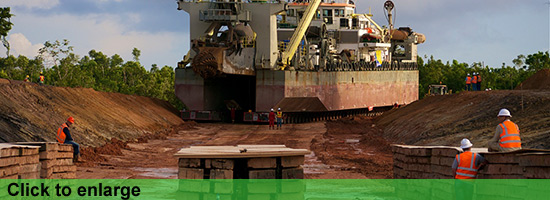
Not only an admirable mission by the men of Boskalis, but certainly a feat expertise of Dutch origin. For me and my camera assistant a huge challenge as well to capture this spectacle in a visual attractive way. The preview along the route showed already a considerable number of potential angles, but at the moment itself, it always takes improvisation in the constantly-changing conditions such as rain, bright sun and safety measures for that moment.
The various obstacles along the route were shot with 5 HD-cameras; a Panasonic AVCCAM and two Panasonic GH-1 DSLR cameras with variable lenses. The smaller HDs were mounted along the locations. For the title shot of the documentary we buried one of the cameras in the middle of the muddy road, where the huge Orion passed over perfectly. The snail's pace of the Orion on the trailers through the landscape turned out perfect for time-laps sequences, which, once in the editing studio back in Rio de Janeiro, could be speed up in special effects.
Overall a successful documentary and well- received by the Boskalis team about an exciting mission through the jungle under severe conditions in terms of weather and temperature.
Director – producer: Ernst Daniel NIjboer
2nd Camera – editor: Paolo de Graaff
video:
The Journey of a Dredge from Visuals Studio Brazil on Vimeo.
mentioned:
Visuals Studio Brazil
Boskalis
Mammoet Brazil
Panasonic